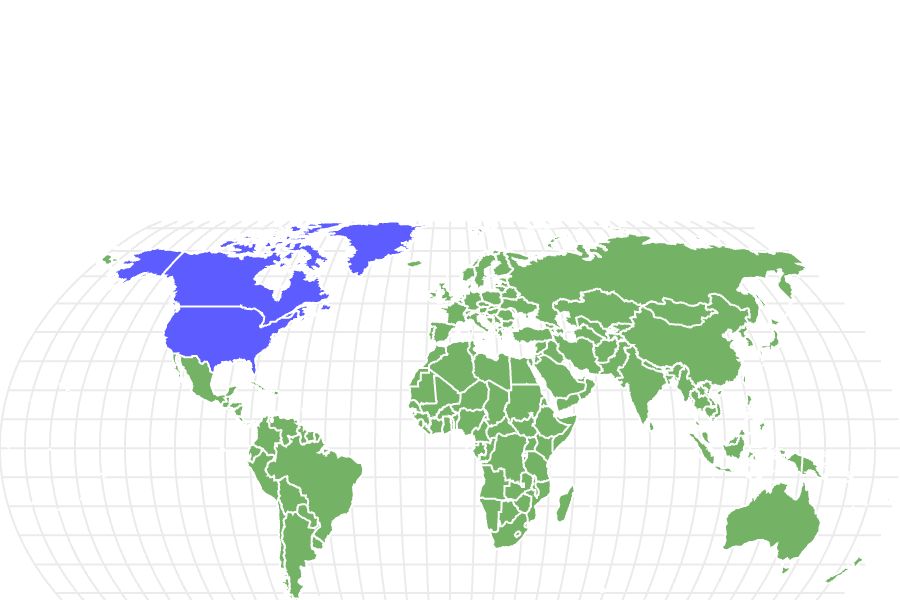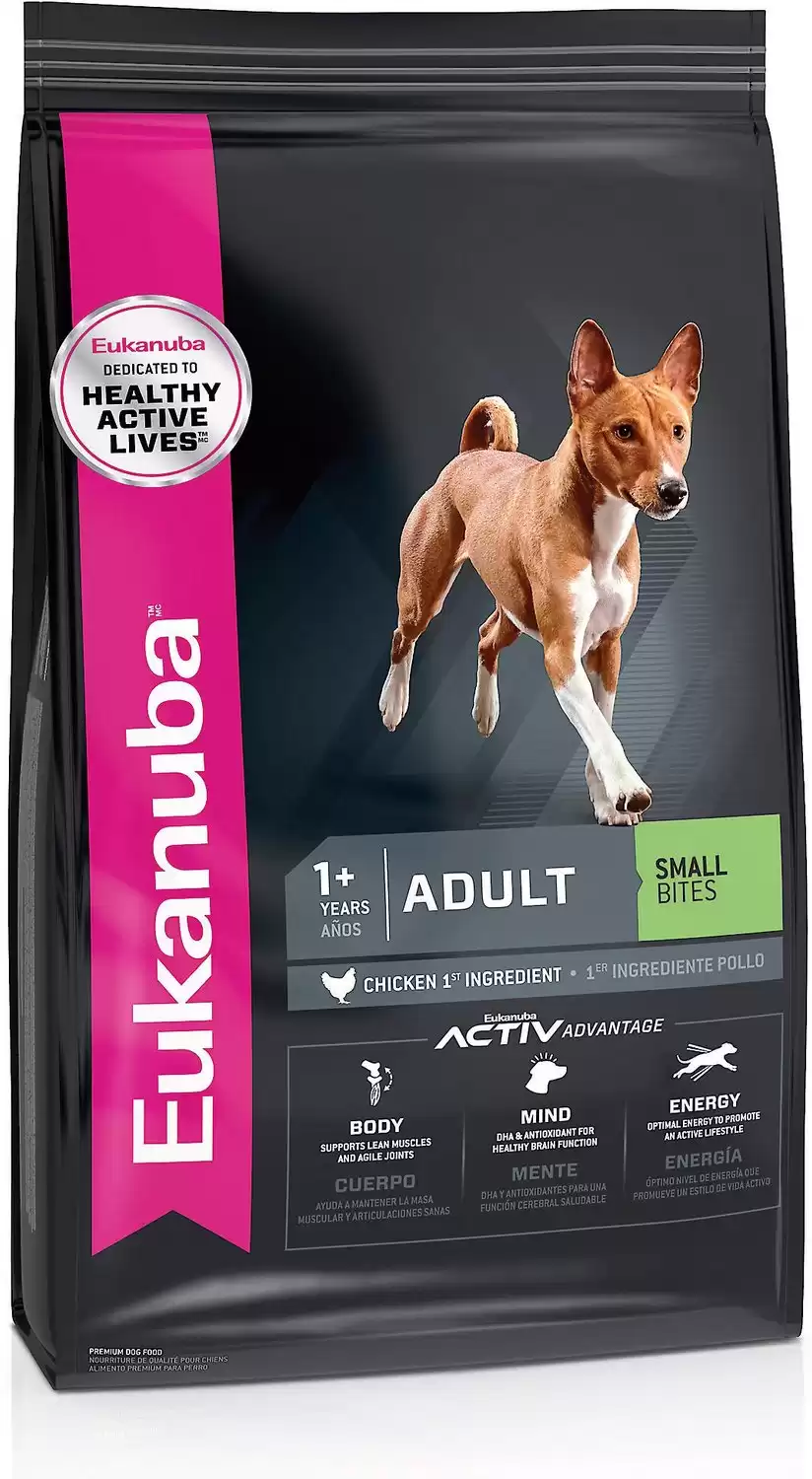Torkie
Canis lupus familiaris
The Torkie is alert and very vocal so it makes a great watchdog.
Advertisement
Torkie Scientific Classification
- Kingdom
- Animalia
- Phylum
- Chordata
- Class
- Mammalia
- Order
- Carnivora
- Family
- Canidae
- Genus
- Canis
- Scientific Name
- Canis lupus familiaris
Read our Complete Guide to Classification of Animals.
Torkie Conservation Status
Torkie Facts
- Name Of Young
- Puppy
- Fun Fact
- The Torkie is alert and very vocal so it makes a great watchdog.
- Training
- Requires training and can be stubborn
- Age Of Independence
- 3 months
Torkie Physical Characteristics
- Color
- White-Brown
- Multi-colored
- Black-Brown
- Skin Type
- Hair
- Top Speed
- 10 mph
- Lifespan
- 13-15 years
- Weight
- 7-10 lbs
- Height
- 8-9 inches
- Length
- 9-10 inches
- Age of Sexual Maturity
- 12 months
- Age of Weaning
- 2 months
Torkie as a Pet:
- General Health
- Energy Level
- Shedability
- Trainability
- Intelligence
- Tendency to Chew
- Size
- Family and kid friendliness
- Yappiness / Barking
- High
- Separation Anxiety
- High
- Preferred Temperature
- Warm climate
- Exercise Needs
- Low
- Friendly With Other Dogs
- Moderate
- Pure bred cost to own
- $500-$1,000
- Dog group
- Terrier
- Male weight
- 7-10 lbs
- Female weight
- 7-10 lbs
This post may contain affiliate links to our partners like Chewy, Amazon, and others. Purchasing through these helps us further the A-Z Animals mission to educate about the world's species.
View all of the Torkie images!
Torkies are sweet, affectionate dogs with high energy levels that are best suited for seniors or singles.
The Torkie is a crossbreed between a Yorkshire Terrier and Toy Fox Terrier. This dog belongs to the Terrier group and is classified as a toy dog due to its small size. The breed has a high prey drive due to its ancestors being vermin hunters. They are sweet, affectionate dogs with high energy levels. They are not good around children and are best suited for seniors or singles.
See all of our expert product reviews.
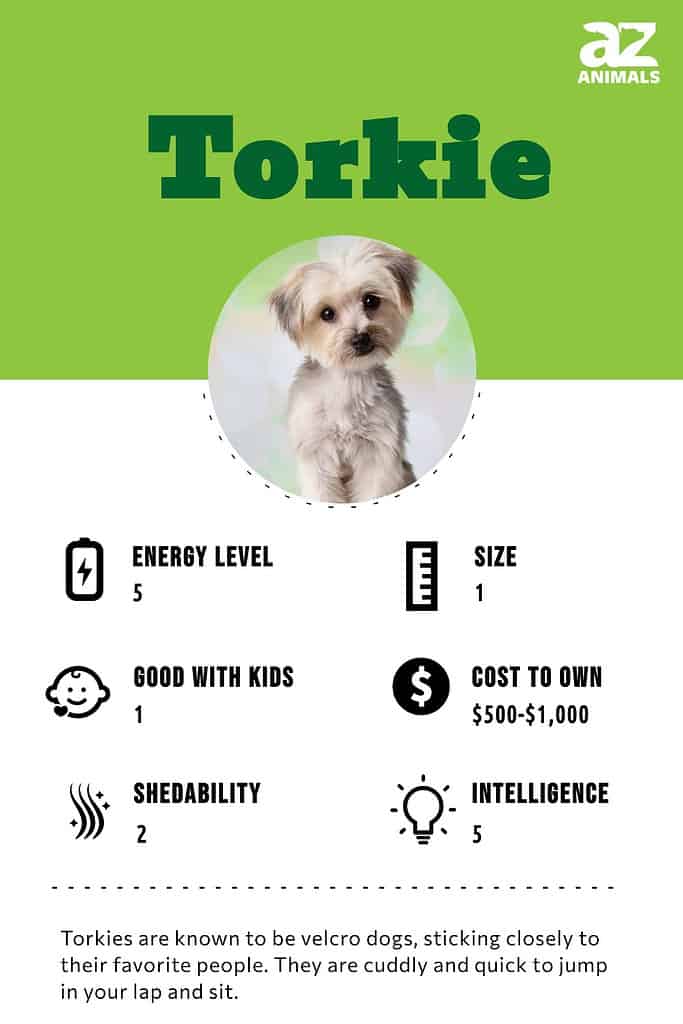
Owning a Torkie: 3 Pros and Cons
| Pros! | Cons! |
|---|---|
| Light shedder A Torkie’s coat is low-maintenance as it doesn’t shed much. A light brushing daily prevents knots and they rarely need to visit the groomer. | Should not be off-leash outdoors Torkies will run off if not leashed outside. These dogs are terriers, so they have a high prey drive toward smaller animals. |
| Great watchdog The Torkie’s alertness, intelligence and guarding instincts make it an excellent watchdog. | Barks a lot Like its parent breed the Toy Fox Terrier, the Torkie is prone to noisy barking. |
| Loving lap dog Torkies are known to be velcro dogs, sticking closely to their favorite people. They are cuddly and quick to jump in your lap and sit. | Needs a lot of training Torkies are intelligent dogs but have a reputation for being stubborn. It’s important to be assertive early on and use positive reinforcement. |
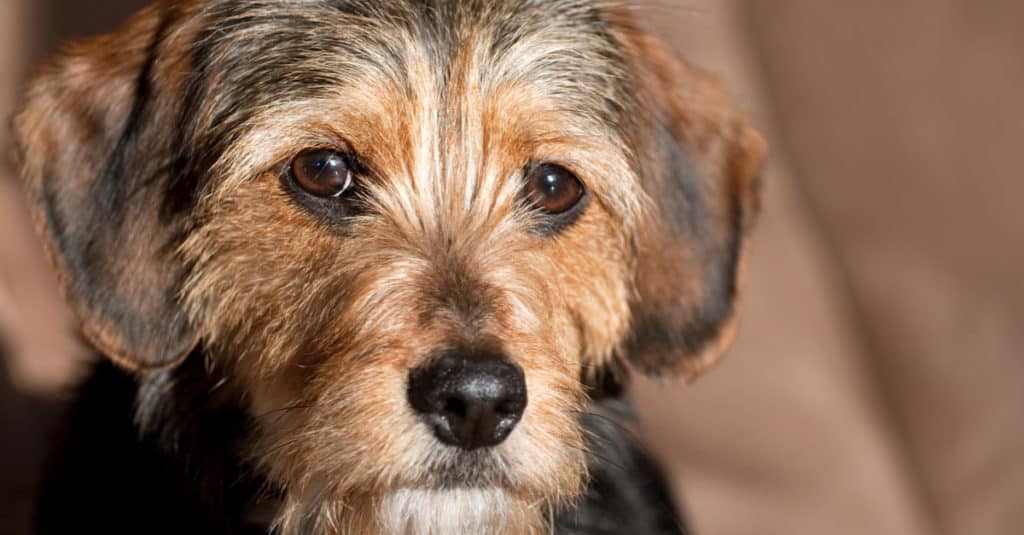
The Torkie’s intelligence and alertness make it a good watchdog.
©ARENA Creative/Shutterstock.com
Evolution and Origins
While the exact origins of the Torkie are uncertain, it’s possible that it was introduced in the U.S. in the 1990s when designer dogs were becoming popular. Seeing as both of the Torkie’s parent breeds are terriers, this dog has inherited a lot of terrier characteristics so it can be helpful to look at their origins to understand more about this breed.
The Toy Fox Terrier was bred in the U.S. in the 1930s as a vermin hunter and then later became a circus performer. It is descended from the larger Smooth Fox Terrier, and some breeders can trace their dogs’ ancestry to a fox terrier called Foiler, who was the first of the breed to be registered with England’s Kennel Club around 1875-76. It’s thought the Toy Fox Terrier may have been developed by breeding the Smooth Fox Terrier with a mix of other breeds including the Toy Manchester Terrier, Italian Greyhound, Miniature Pinscher, and Chihuahua.
The Yorkshire Terrier was bred in England in the 1800s to hunt and kill rodents and pests in the mines and textile mills of Yorkshire, later used for hunting game such as badgers and foxes in forests, and then became popular as a family pet. The Yorkshire Terrier is said to have come about by crossbreeding a group of miniature Scottish terriers including the Paisley, Skye, and Clydesdale breeds.
Health and Entertainment for your Torkie
See all of our expert product reviews.
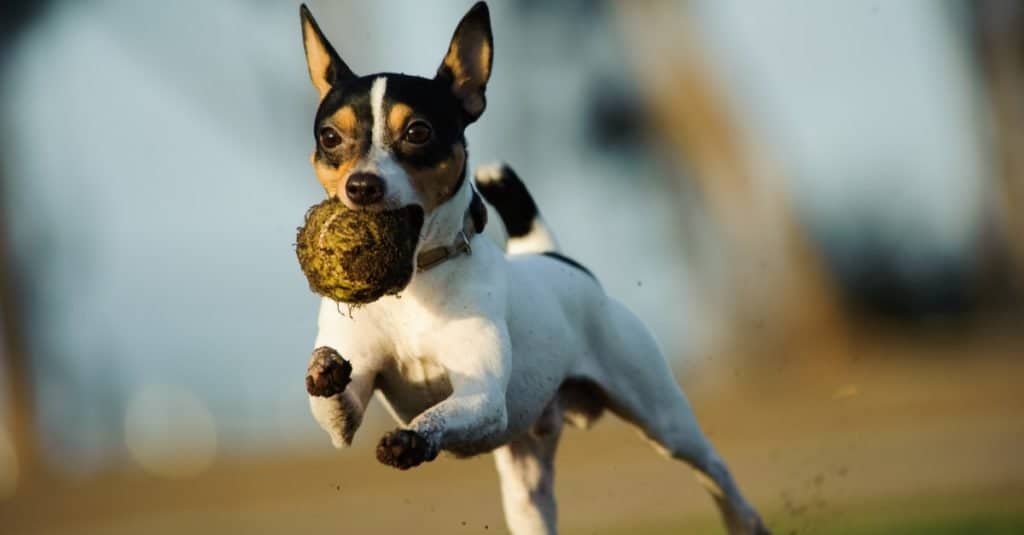
The Toy Fox Terrier, the Torkie’s parent breed, was originally used as a vermin hunter and circus performer.
©everydoghasastory/Shutterstock.com
Size and Weight
These are very small dogs. In fact, they tend to be the same size regardless of which sex they are. These little dogs are 8-9 inches tall and weigh between 7 and 10 pounds. Puppies are 3 pounds at birth, on average.
| Height (Male) | 8-9 Inches |
| Height (Female) | 8-9 Inches |
| Weight (male) | 7-10 Pounds |
| Weight (female) | 7-10 Pounds |
Common Health Issues
Smaller dogs in general are prone to oral health issues. Also, like its parent breed the Yorkshire Terrier, this specific breed of dog suffers from patellar luxation, meaning loose knee joints. Torkies have weak windpipes which sometimes collapse. This results in a chronic cough.
Torkies suffer from low blood sugar, a condition called hypoglycemia. They also have vision issues as well. Namely, cataracts are a common concern in these little dogs. They may need surgery to prevent blindness as they age. This breed of dog sometimes suffers from a liver shunt.
Torkies’ health concerns include:
- Plaque Build up
- Patellar Luxation
- Collapsing Windpipe
- Hypoglycemia
- Cataracts.
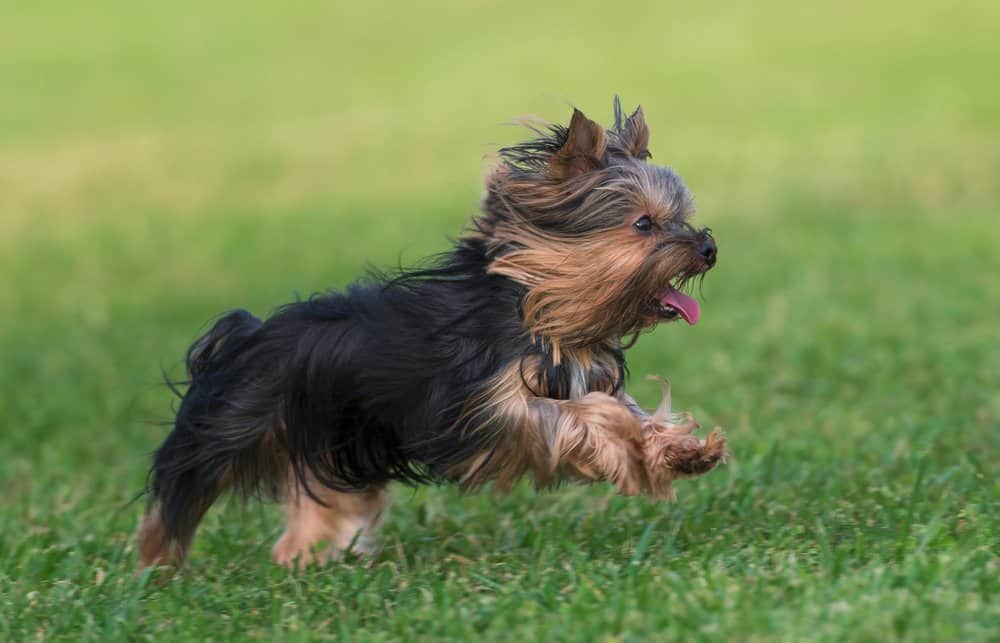
Like its parent breed the Yorkshire Terrier, the Torkie is prone to patellar luxation.
©tsik/Shutterstock.com
Temperament and Behavior
Torkies are high-energy dogs with cheerful personalities. They are loving and loyal in their behavior towards their owners. Torkies are known to be velcro dogs, sticking closely to their favorite people. They are cuddly and enjoy their role as lap dogs.
This breed of dog is not good around children. Small children may mishandle them which will make them feel threatened and possibly nibble at them. Torkies have curious and smart personalities but are stubborn when it comes to training.
Due to the hunting instincts of its ancestors, you must be careful letting this dog breed off the leash. These dogs are terriers, so they have a high prey drive toward smaller animals. Plus, Torkies are alert creatures and make good watchdogs. Sometimes they are loud, and noisy barking can be a problem.
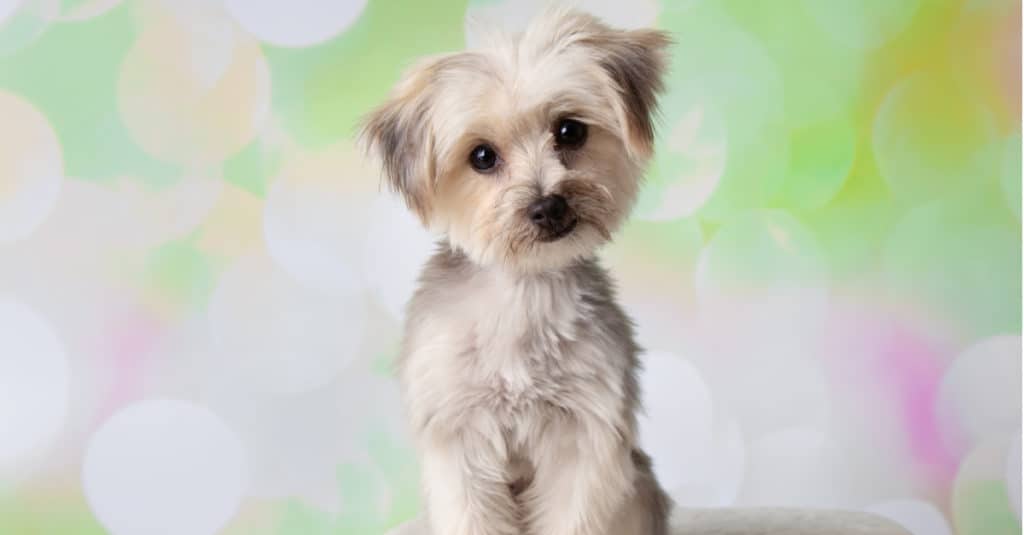
Torkies are loving, loyal, and known to be velcro dogs sticking close to their owners.
©Ashley Swanson/Shutterstock.com
How to Take Care of a Torkie
Thirty calories per pound of body weight are sufficient for the average dog. Toy dog breeds have a fast metabolism and require ten pounds more than an average or bigger dog would require. It is important to feed this dog efficiently to aid against hypoglycemia, which is low blood sugar. Have your Torkie eat a square meal 90 minutes before exercising to avoid blood sugar crashes.
The Best Dog Food for Torkies
The Torkie is a toy dog breed. This means you will not have to feed it a lot of food. One cup of food a day is sufficient for this small canine. Specifically, you should opt for dry food to help mitigate dental issues. It is important to not overfeed this dog so that it does not become overweight and further complicate patella luxation.
Torkie puppy food: You will need to feed a puppy 400 calories a day. Adult dogs of this breed require 100-150 calories a day. Dry food is good for this breed of dog because the texture helps scrub the plaque off the teeth.
Torkie adult food: Dogs in general need protein, fruits, and vegetables in their diet. Fish oils will help maintain the Torkie’s coat. Carbohydrates are good for energy and fiber and are easy to digest in dogs with stomach problems. Any dog food with omega 3 or omega 6 fatty acids is good for this breed.
Therefore, at A-Z Animals, we find that the best dog food for Torkies is Eukanuba Adult Small Bites Dry Dog Food.
Firstly, the crunchy texture and proprietary, S-shaped ‘3D DentaDefense’ kibble pieces are engineered to remove tartar and plaque for healthier gums and teeth. What’s more, the calcium-phosphorus combo helps with Torkies’ oral health, too. The natural animal protein from real chicken delivers glucosamine for the joints, and beta-carotene enhances eye health.
Try out Eukanuba Small Bites dog food, available on Chewy and Amazon.
- Small bite blend suited for dogs with smaller jaws
- DHA and antioxidants for brain health
- High protein to provide energy
- Supports lean muscles and healthy joints
Maintenance and Grooming
The coat of a Torkie is low maintenance. They do not shed much. A light brushing daily prevents knots and tangles. Behind the ears need to be wiped weekly. They rarely need to visit the groomer. Toenails will need to be clipped monthly. Brushing the teeth will help prevent plaque buildup.
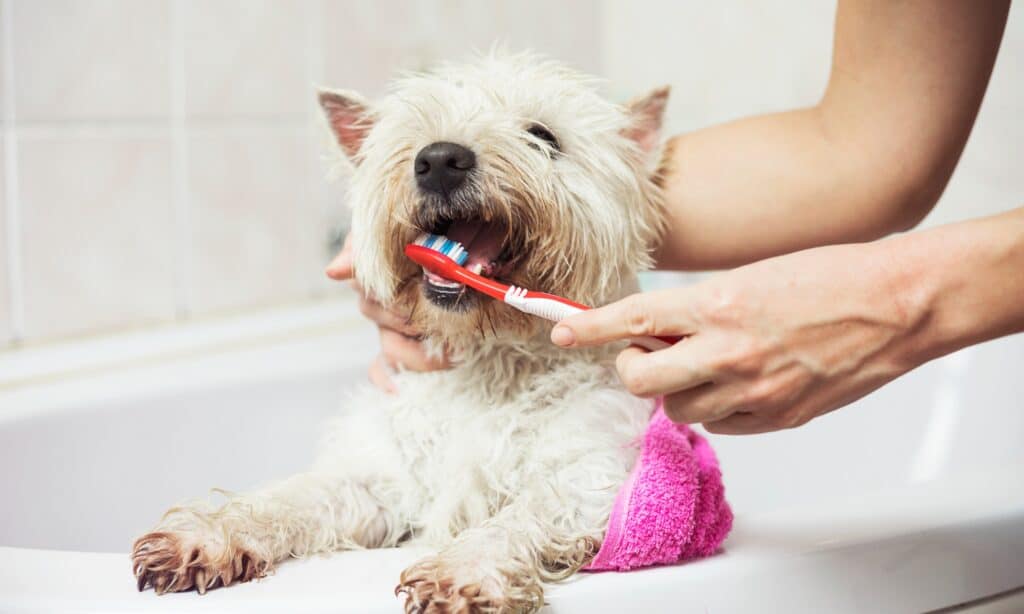
Cleaning your dog’s teeth regularly helps to prevent plaque from building up.
©iStock.com/Sladic
Training
Torkies are intelligent dogs. They have a reputation for being stubborn sometimes. The fact that both parents of this dog are Terrier breeds means they have a bit of “attitude.” It is important to be assertive early on and use positive reinforcement. Socialization with people and other dogs is important early on to ensure you will have a friendly dog. This dog should not be put with smaller animals due to their predatory instincts; they may view the smaller animal as a snack instead of a roommate.
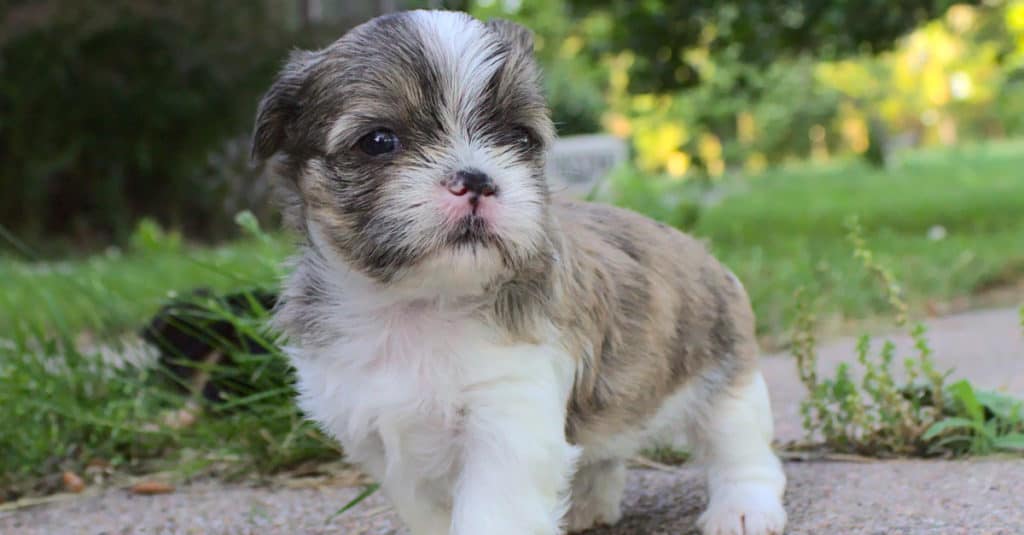
You should start training and socialization early on with Torkie puppies.
©Plains Photography/Shutterstock.com
Exercise
This dog is happy to engage and play with the owner but will be just as quick to jump in your lap and sit. They require little exercise but respond well to daily walks. A 30-minute walk daily is sufficient for this small canine. This dog breed is perfect for an apartment or small family home.
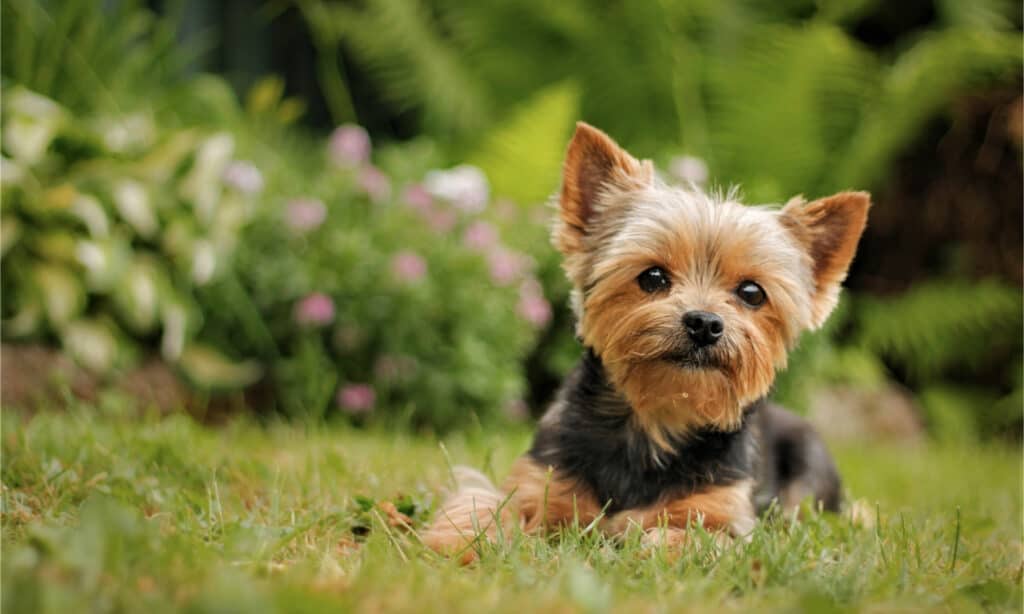
Like its parent breed the Yorkshire Terrier, the Torkie responds well to some daily time outdoors.
©Shllabadibum Bubidibam/Shutterstock.com
Puppies
This breed is highly possessive of its owners and toys. Early in the morning, it is beneficial to bring your puppy outside to the same general area, which will help train it to use the bathroom outside and get used to being outside. Leash training is crucial to preventing it from running after smaller animals outside. Intelligence and eagerness being strong traits of this breed make it easy to teach the puppy new and amusing tricks.
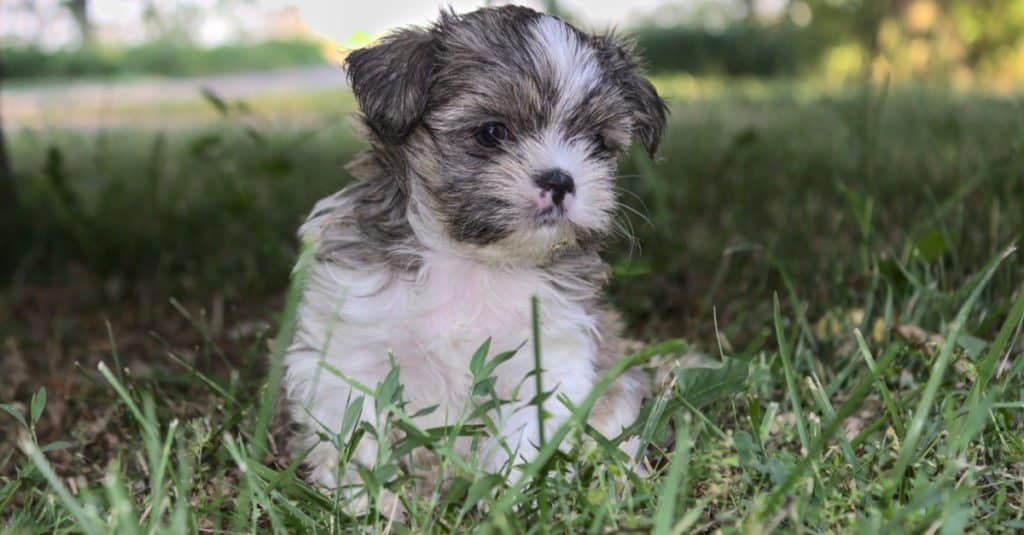
A Torkie puppy should be taken to the same spot daily to help with potty training.
©Plains Photography/Shutterstock.com
Torkies and Children
This breed does not do well around small children. Small children often do not know how to play with this small canine and unintentionally are rough or mishandle the dog. This results in the dog feeling threatened or alarmed and starting to nip or bite.
Similar Breeds to the Torkie
Similar breeds to the Torkie include the Toy Fox Terrier, Yorkshire Terrier, and Pomeranian. The Torkie’s parent breeds are the Toy Fox Terrier and Yorkshire Terrier. While the Pomeranian is a whole other kind of breed altogether, it is similar in size.
- Toy Fox Terrier – This is a small breed of dog located in North America. The lifespan of this breed is eleven to fourteen years. They reach a maximum of 14 pounds in weight. This small canine is loving and loyal in its nature. This dog is intelligent, energetic, and learns fast.
- Yorkshire Terrier – This small canine breed originated in Europe. They are alert and have the spirit of bigger dogs. They make good guard dogs. Yorkies shed lightly and don’t need much exercise. Puppies weigh 4 pounds at birth and max out at 15 pounds as adult dogs.
- Pomeranian – This small dog is of Nordic descent. This dog weighs 8 pounds when it is fully grown. The Pomeranian stands 7 inches tall. They are intelligent canines.
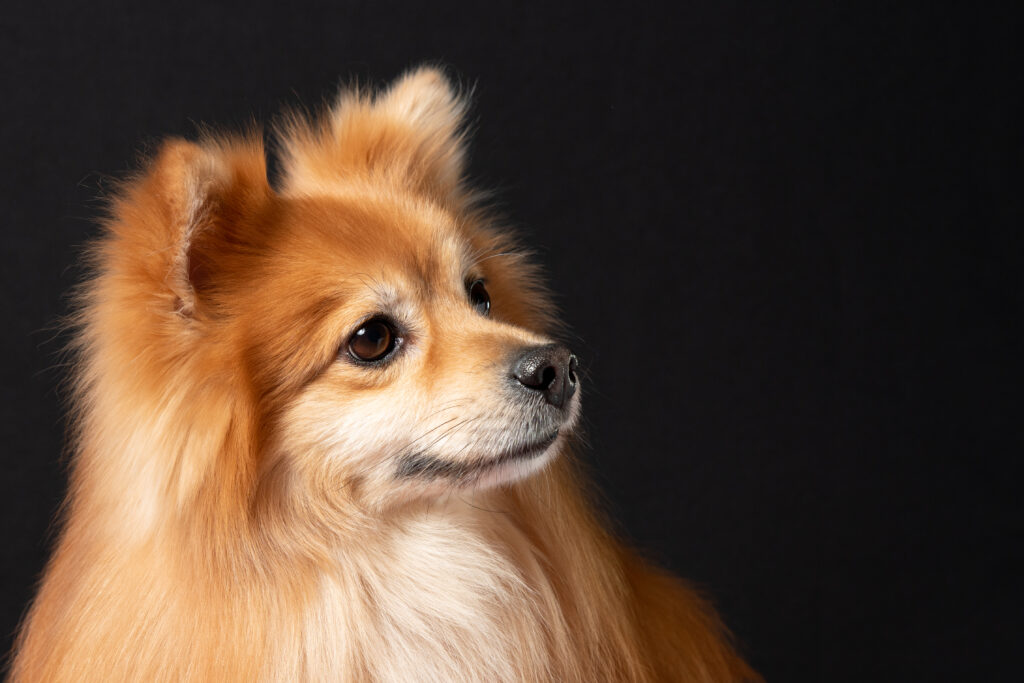
The Pomeranian is another small dog similar to the Torkie.
©Jen Ottepka/Shutterstock.com
Popular Names for Torkies
- Baxter
- Bella
- Charlie
- Coco
- Lily
Torkie FAQs (Frequently Asked Questions)
How much does the Torkie cost to own ?
The cost to obtain a Torkie is between $500 and $1,000. Annual expenses run start at $300 and go up if the dog experiences health problems.
Is the Torkie good with children?
This breed is not good with small children. If mishandled the dog will feel threatened and bite. This dog is fragile.
How long do Torkies live?
Torkies live to be 13 to 16 years of age.
Is the Torkie an aggressive breed?
No, however, they need to be socialized from a young age with other people and pets. They need to be kept away from smaller animals and must be on a leash when outside.
Do Torkies bark a lot?
Yes, they are alert and very vocal creatures. They make great guard dogs.
Are Torkies easy to train?
Yes, if positive reinforcement is used and you are assertive early on. They are especially easy for owners with previous dog experience.
Thank you for reading! Have some feedback for us? Contact the AZ Animals editorial team.
Sources
- ACVS.org - Patellar Luxations, Available here: https://www.acvs.org/small-animal/patellar-luxations
- (1970)

